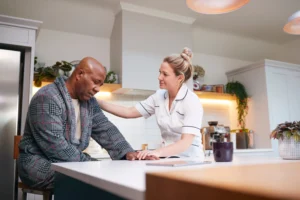Top Signs Your Aging Parent May Need Home Care Support
10/14/2025

It can be scary to see changes in your aging parent. Being able to spot warning signs early can make a big difference in keeping your parents safe and independent for a longer time. What seems strange in your family might be normal for someone else’s family. This guide will help you identify common signs that your parents may need assistance at home.
Why These Signs Are Important
If you catch problems early, you have time to plan rather than react to a crisis. Normal aging is distinct from warning signs that something more serious is happening. The most important thing is to watch. Regardless of how you view your parents, whether in person or via video chat, make it a point to pay attention to their surroundings and daily life.
Poor Personal Hygiene
Families often notice a change in how their parents take care of themselves as one of the first signs. Hair that hasn’t been washed, wearing the same clothes for days, that wasn’t a problem before. These changes occur frequently because it’s challenging to perform basic grooming tasks. You need strength and balance to get in and out of the shower safely. If your parents start to neglect their personal care, it usually means they need help with these daily tasks.
Unexplained Bruises or Frequent Injuries
If you see that your parents have unexplained bruises or that minor accidents happen a lot, this is a sign that something is wrong. If you forget about a hot stove, you might get unexplained burns. Pay attention to how your parents move around their house. Do they use furniture to help them? These changes in mobility increase the likelihood of falls.
Weight Loss or Changes in Eating Habits
It’s constantly worrying when you lose a lot of weight. They might be skipping meals because they think cooking is too much work. Some older individuals also exhibit signs of dehydration. Not drinking enough water can cause dry skin, confusion, and dizziness. Not eating well can affect your energy levels and the health of your immune system.
Spoiled or Expired Food in the Kitchen
When you go back, open the fridge. What you should look for is:
- Food that is moldy or rotten and should have been thrown away weeks ago.
- Things in the pantry that have gone bad.
- A fridge that is empty and has very little fresh food.
- Snacks that have been processed and don’t require preparation.
These signs indicate that either the grocery store is too difficult to access or that there are memory problems, which raises concerns about food safety.
No Longer Cooking Meals
If your parent used to love cooking but now the kitchen looks empty, something has changed. Check pots, pans, and countertops for burn marks. These are serious safety issues that highlight the risk of forgetting things while cooking. When someone is unable to cook safely, they need help preparing meals.
Forgetting to Take Medications
Look in the medicine cabinet. Are there any unopened bottles? Are there more than one refill of the same medicine? Not taking your medicine on time or taking it the wrong way can cause serious health problems. A caregiver can help organize pills and remind you to take them when managing your medications gets too hard.
Difficulty Getting Up from Seated Position
When your parents get up from a chair, watch them. Do they have trouble? Do they use their arms to lift themselves? It means that your muscles are weakening and your balance is deteriorating. Due to these physical issues, your parents likely require assistance with mobility.
Cluttered, Dirty, or Disorganized House
The laundry doesn’t get done. Rooms that used to be tidy now seem messy. When bending and lifting become painful, housekeeping tasks can become physically demanding. Getting professional help with cleaning can make the home safe and dignified again.
Neglected Home or Yard Maintenance
Has the grass grown too high? Do you leave minor repairs undone? A broken stair railing is dangerous. Many older adults no longer have the physical ability to do home maintenance. It’s time to get help when basic maintenance starts to slip.
Missing Important Appointments
Your parents used to always go to the doctor. Now they forget about visits that were planned or come on the wrong day. When you miss a doctor’s appointment, your health problems go unchecked. Someone who helps you keep track of your calendar and sends you reminders can make sure you don’t miss anything important.
Unpaid Bills or Financial Disorganization
One of the first signs of cognitive decline is often trouble with money management. There are numerous unopened letters, including bills that should have been paid. Utilities might be turned off because payments have not been made. Helping with paperwork or setting up automatic payments can prevent significant problems from arising.
Withdrawal from Social Activities and Hobbies
Has your parents stopped going to church? Are they no longer going to their book club? There are many reasons why people withdraw from society. Being alone can be detrimental to older people. It makes cognitive decline happen faster and depression worse. They can get back into activities that make them happy with the help of transportation and companionship.
Mood Changes or Depression
Older adults who are depressed often show different signs than younger people who are depressed. Keep an eye out for these changes:
- Crying or being sad all the time
- Lack of energy or drive
- Being angry or irritable for no reason
- Pulling away from family
Depression is not a regular part of getting older, and you should take it seriously.

Memory Problems or Confusion
Changes in memory can range from simple forgetfulness to more serious signs of dementia. Keep an eye out for these patterns:
- Not remembering the names of close family members
- Asking the same questions over and over
- Getting lost in places you know well
- Not knowing what time or date it is
These signs might mean that you have dementia. It is essential to see a doctor as soon as possible.
Difficulty with Daily Tasks
Things you used to do every day that were easy now make you angry. Your parents might have trouble using the microwave or TV remote. When reaction times slow down, driving becomes even more dangerous. Getting help with transportation takes away the worry and keeps your parents on the move.
Having the Conversation
One of the hardest things you will ever have to do is talk to your parents about needing help. Use specific examples instead of general accusations to begin. Try saying something like this instead of saying you think they need help. I noticed that you don’t have much food in the house, Mom. Are you having trouble getting to the store?
Hear what your parents have to say. Discuss maintaining their freedom, rather than taking it away. Pick a time when you are both calm and quiet. It’s normal for your parents to say no. They should discuss it a few times before they agree that changes are needed.
What to Do Next: Steps to Take Right Away
Write down your worries first. Write down what you have seen. Schedule an appointment with your parents’ doctor to discuss the changes you’ve noticed. Consider whether you need to act immediately or if you have time to plan.
Explore Support Options
Many services can help keep your parents safe at home. Think about which combination works best:
- Home care services to help with bathing, dressing, meals, and cleaning the house
- Adult day care programs for socializing and keeping an eye on people
- Services that bring you meals
- Help with getting around
- Systems for emergency alerts
Only provide the help that is needed at this time, and adjust it as necessary.
Understanding Different Levels of Care
Some situations need more help than others. Knowing your options helps you find the right services for your parents’ real needs.
- Care for Companions. What it has: light cleaning, making meals, talking, and driving. Best for parents who can manage most things on their own but need assistance with some tasks.
- Taking care of yourself. What it comes with: assistance with getting dressed, bathing, grooming, and mobility. Best for parents who need help with daily tasks in person.
- Nursing with skill. What it includes: medical care, wound care, managing medications, and therapy. Best for parents who are recovering from surgery or dealing with a serious illness.
When Home Care Might Be the Best Option
With home care, your parents can stay in a familiar place while receiving professional help. The goal is to keep people independent, not to take it away from them. One of the best aspects of it is its flexibility. Care can start with just a few hours a week and change as needs change.
Think about home care when:
- Your parents have trouble with everyday tasks but want to stay home.
- Living alone can be dangerous due to safety concerns.
- Family members can’t give all the care that is needed.
- Being alone is bad for mental health.
Getting professional help often means that you won’t have to make bigger changes later.
Conclusion
It’s not easy to realize that your parents need help. However, seeing the signs and taking action is one of the most caring things you can do. The most important thing is to act before a crisis makes you make quick choices. Early intervention provides you with time to explore your options and receive the right level of support.
Go with your gut. Numerous resources are available to help families along the way. Your parents took care of you and raised you. Now it’s your job to ensure they receive the help and care they need to live a long, safe, and independent life.